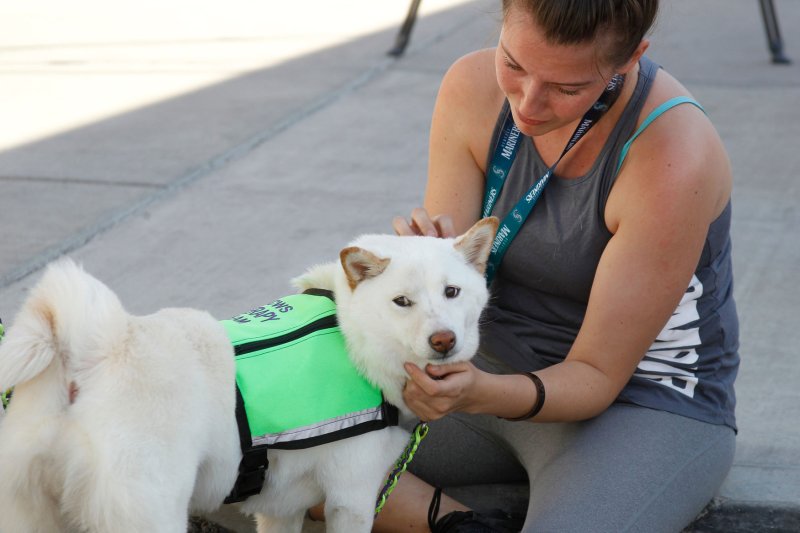A new study showed therapy dogs aren't more empathetic or reactive to owners in distress than other dogs. Photo by James Atoa/UPI |
License Photo
July 24 (UPI) -- Behavioral experiments suggest dogs are prosocial and empathetic, and some dogs will help owners in distress.
To better understand how dogs relate and react to humans in distress, scientists observed the responses of dogs to different stimuli and scenarios. In one scenario, researchers had dog owners either make cries of distress or hum while sitting in a chair behind a transparent door.
Researchers observed the dogs' responses and measured their heart rates. In a followup experiment, researchers analyzed how dogs looked at their owners to gauge the strength of their relationship.
The results showed dogs were equally likely to open the door in response to both crying and humming. However, dogs opened the door more quickly when reacting to their owners' cries. Dogs with lower stress responses to crying were more likely to open the door and open it quickly.
Researchers also found dogs with the strongest bond with their owners were more faster to open the door.
The findings -- detailed in the journal PeerJ -- confirmed that dogs can not only feel empathy, but act on empathy. However, dogs were only able to act on their empathy when they were able to suppress their own stress response and remain sufficiently calm. A similar phenomenon has been observed among children.
"It appears that adopting another's emotional state through emotional contagion alone is not sufficient to motivate an empathetic helping response; otherwise, the most stressed dogs could have also opened the door," Julia Meyers-Manor, a researcher at Ripon College, said in a news release. "The extent of this empathetic response and under what conditions it can be elicited deserve further investigation, especially as it can improve our understanding of the shared evolutionary history of humans and dogs."
Half of the dogs participating in the experiments were therapy dogs. The results showed therapy dogs were no more likely to be empathetic or rescue-oriented. Therapy dog certification programs select for skill related to training and obedience, not their responsiveness to human emotional states.
"It might be beneficial for therapy organizations to consider more traits important for therapeutic improvement, such as empathy, in their testing protocols," said Meyers-Manor. "It would also be interesting to determine whether service dogs show a different pattern of results given their extensive training in attentiveness to their human companions."
Until the 1980s, service dogs were used almost exclusively by humans with hearing or vision impairment. But therapy dogs are increasingly used to ease a variety of mental and emotional health problems, including anxiety and PTSD. In 2013 and 2014, more than 4,000 service dogs were placed in the United States, according to the the latest available figures.















